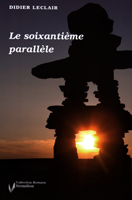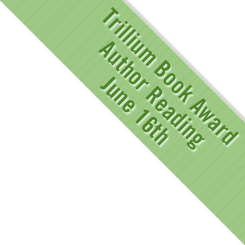Open Book: Ontario is celebrating the 24th Annual Trillium Book Award with The Trillium Ten/Trillium Dix interview series. Find out what this year's Trillium Book Award finalists were doing when they heard the news about their nomination, where in the province they most love to write, who their favourite Ontario authors are and more by following our series. Winners of the Trillium Awards will be announced on Friday, June 17th.
Toronto-based novelist Didier Leclair is nominated for the French-Language Trillium Book Award for Le soixantième parallèle (Les Éditions du Vermillon), the story of an RCMP officer struggling against poverty, drugs and corruption in the tiny community of Misty River.
_________________________________
Open Book:
Parlez-nous de votre ouvrage qui a été nommé au Prix littéraire Trillium.
Didier Leclair:
Dans Le soixantième parallèle, il est question d'un agent de la GRC, Mark Finlay, qui tente de faire son travail; c'est-à-dire maintenir l'ordre et la justice à Misty River, une petite communauté du Grand Nord, non loin de Yellowknife. Il découvre dans son travail qu'il y a des relations difficiles entre les Autochtones et les Blancs, que le trafic de drogue est un problème récurrent. Il cherche en même temps à faire la lumière sur ce qu'on tente de lui cacher, la véritable raison de la mort d'un collègue de la GRC qui était en poste avant lui à Misty River.
Le Soixantième parallèle is about an RCMP officer, Mark Finlay, attempting to maintain law and order in a small community, Misty River, not far from Yellowknife. He discovers the complex relations between First Nations people and white residents and the ongoing drug dealing in the community. He also tries to uncover the real reason of the death of a colleague officer who was posted in Misty River before his time.
OB:
Qu’est-ce qui vous a donné l’idée d’écrire cet ouvrage qui a reçu une nomination?
DL:
L'idée de ce livre vient du fait qu'il y a dans notre pays des défis auxquels on ne fait pas face. La colonisation est terminée depuis plus d'un siècle, mais on découvre encore qu'au-dessus du soixantième parallèle, l'exploitation des richesses naturelles ne semble pas avoir un impact positif sur la population locale à majorité autochtone et inuite. Les conditions de vie et les défis sociaux ressemblent à celles du tiers monde.
The idea for the book springs from the challenges our country is reluctant to tackle. The colonization has been over for more than a century; however, we still discover that above the sixtieth parallel, exploitation of natural resources does not impact positively on the local population composed mainly of aboriginals and Inuit. The life conditions and the social challenges are comparable to third world countries.
OB:
Que faisiez-vous lorsque vous avez appris que votre livre était nommé au Prix littéraire Trillium?
DL:
Mon éditrice m'a appelé au travail pour m'annoncer que mon livre était sélectionné.
My publisher called me at work to let me know that my book was among the shortlisted.
OB:
Quel livre donneriez-vous à un visiteur pour lui donner un aperçu de l’Ontario?
DL:
Je donnerais n'importe quel livre dont l'histoire se passe en Ontario et dont l'auteur(e) a vécu ici.
I'd give any book with a story set in Ontario by a writer who lived here.
OB:
Quel lieu en Ontario vous inspire le plus?
DL:
Le lieu qui m'inspire le plus en Ontario est Toronto.
The place that inspires me most is Toronto.
OB:
Quel est votre auteur ontarien préféré?
DL:
Je ne nommerai aucun auteur(e) d'ici que j'aime pour n'oublier personne.
I won't say any name of Ontario writers that I like, so I won't forget any.
OB:
Avez-vous une citation préférée à propos de l’écriture?
DL:
« La littérature est la preuve que la vie ne suffit pas. » (Fernando Pessoa)
"Literature is evidence that life is not enough." (Fernando Pessoa)
OB:
Qu’est-ce qui vous distrait de l’écriture?
DL:
Lire me distrait de l'écriture.
Reading gives me a break from writing.
OB:
Que lisez-vous en ce moment?
DL:
Je relis un roman de Walter Mosley, Devil in a Blue Dress.
I am re-reading a novel by Walter Mosley Devil in a Blue Dress.
OB:
Que pouvez-vous nous dire au sujet de votre prochain projet?
DL:
Je ne peux rien dire de mon prochain projet.
I can’t say anything about my next project.
 |
Didier Leclair, de son vrai nom Didier Kabagema, est né en 1967 à Montréal. D’origine rwandaise, il a vécu dans différents pays d’Afrique et revient au Canada en 1987. Il a remporté le Prix littéraire Trillium en 2001 pour son premier roman, Toronto, je t'aime, et son deuxième roman, Ce pays qui est le mien, a été finaliste du Prix du Gouverneur général en 2004. Un passage vers l'Occident, son troisième ouvrage de fiction, a été publié en 2007. Le soixantième parallèle, publié en 2010, est son quatrième roman et finaliste du Prix littéraire Trillium 2011.
Didier Leclair is the penname of Didier Kabagema. He was born in 1967 in Montreal. Originally from Rwanda, he lived in different countries in Africa and came back in Canada in 1987. He won the Trillium prize in 2001 for his first novel, Toronto, je t'aime, and his second novel, Ce pays qui est le mien, was shortlisted for the Governor General's Award in 2004. Un passage vers l'Occident was his third novel, published in 2007. Le soixantième parallèle, published in 2010, is a finalist for the 2011 Trillium Book Award.
For more information about Le soixantième parallèle please visit the website for Les Éditions du Vermillon.
Buy this book at your local independent bookstore or online at Chapters/Indigo or Amazon.
|


Post new comment